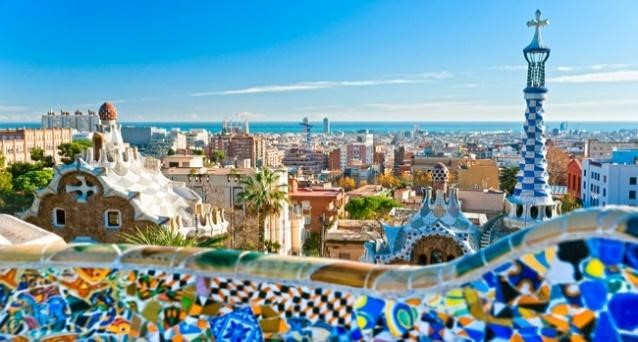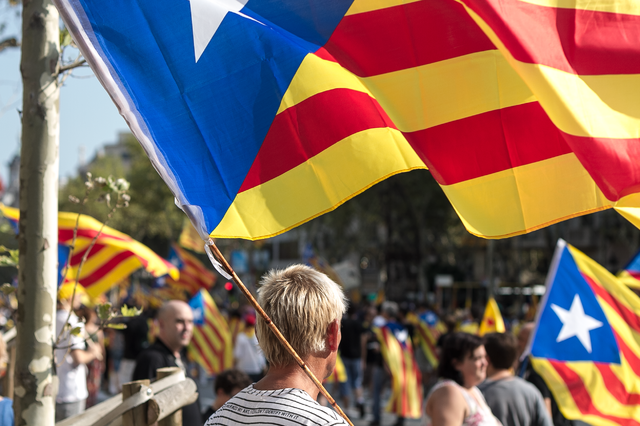Do Catalans Care if You Don’t Speak Catalan?

Photo via Iha
So I decided to move to Barcelona a couple of years ago and immerse myself among Barcelona’s culture; the Catalan culture. My first year in Barcelona was equally exciting as confusing. Why the latter? Well, I had no idea how important Catalan, the co-official language of Catalonia, actually was.
My first dinner gathering, hosted by a native family, was particularly enlightening for me (someone who could barely ask for directions in Spanish at the time). I sat dumbfounded as the children switched with ease from Spanish to Catalan, outstandingly sensitive to the intricate differences between each language. I was surprised to find that not everyone finds it so simple however. The second family to host me admitted that speaking in Spanish made them feel uncomfortable. Thank goodness they were happy to speak in English!
Cata- what?
It may surprise some of you to know that Barcelona, located within the province of Catalonia in the north-east of Spain, hosts one of the largest bilingual communities in all of Europe. According to the BBC the majority of inhabitants can communicate in Catalan and Spanish fluently.
Although, it has many similar qualities to Spanish (to the untrained ear sounding identical), it is undoubtedly a language within its own right. Practising Catalan may not be the first thing you think of when visiting Catalonia, but the similarities to its neighbouring languages (e.g. “Como estás” in Spanish becomes “Com estàs” in Catalan) can actually lay the groundwork for your Spanish, or any other Latin language for that matter. It is also the mother tongue for many locals, so learning even a little will help you quickly identify which language is being spoken. Globally speaking, Catalan is not nearly as widely spoken as Spanish, but many of the locals are keen to keep this language alive. The Government of Catalonia also supports this through funding the promotion of Catalan.
So why is it so important?
There are deep-rooted emotional attachments among native speakers, as Catalan almost ceased to exist during the Francoist dictatorship. Francisco Franco enforced a ban on both public speaking of the Catalan language and celebration of Catalan culture for 40 years. It was the initial period that was particularly tough for the community as most protesters were immediately incarcerated while others were forced into exile.
Learning a new language? Check out our free placement test to see how your level measures up!
Since the transition to democracy in 1975, Catalonians witnessed the return of their democratic liberties. Catalan is now a co-official language along with Spanish, as well as the official language for education and mass media. Just walk around Barcelona today and you can see most public area signs are printed in Catalan, English and Spanish, respectively.
Catalan is also closely tied to the foundation of Catalan culture which can be traced back to the 7th century and, since the reinstatement of Catalan in 1980, September 11th celebrates the National Day of Catalonia. In fact, Catalonia showcases many festivals full of culinary traditions and activities that are characteristic of Catalan culture every year. The celebration of the Three Kings with its fantastic parades and human towers are reminiscent of such centuries-old traditions.
Today, despite the current European economic uncertainty and recent calls by residents of Catalonia to seek independence from Spain, Barcelona attracts over 7.4 million visitors annually and has a history of hosting prestigious conferences and business events. For many, this presents opportunities to work in Barcelona and learn Spanish simultaneously, but some knowledge of Catalan, which is for many their native tongue, can be useful to facilitate integration, both for professional and personal purposes.

Photo via Wikipedia
Eek! I don’t speak Catalan!
As one of my Catalan colleagues said, “Don’t worry too much, showing interest also goes a long way!” Catalonia is still the top destination for international tourists in Spain so, for the majority, speaking Spanish is a part of everyday life. A simple “adéu” for “good bye” or “bé” to say “good” will really impress the locals though. If you intend to stay for an extended period of time, Catalan can be particularly useful when job-hunting and befriending Catalonians. Why not see for yourself next time you’re in Catalonia with some of these phrases below:
- Good morning – Bon dia
- How are you? – Com estàs?
- Good, thank you – Bé gràcies
- What’s your name? – Com et dius?
- My name is… – Em dic…
- Nice to meet you – Encantat
- Goodbye -Adéu
What bilingual or multilingual communities have you visited? Do the locals mind if you only learn one of the languages? Share your experiences in the comments below!
